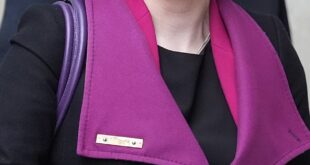It says the Inclusive Language Guide is a resource to help people in the charity sector “to think about how the way they write can reinforce forms of inequality that we work to end”.
The introduction to the charity’s Inclusive Language Guide says it recognises “that this guide has its origin in English, the language of a colonizing nation”.
“We acknowledge the Anglo-supremacy of the sector as part of its coloniality. This guide aims to support people who have to work and communicate in the English language as part of this colonial legacy.
“However, we recognize that the dominance of English is one of the key issues that must be addressed in order to decolonise our ways of working and shift power.”
The guide tells its workers to avoid using ‘mother’ or ‘father’ and to use ‘parent’ and ‘parenthood’ instead.
It explains: “In patriarchal culture, social norms around gender result in designated roles for parents that reflect expectations of that gender. Some transgender and non-binary people may identify with these roles. However, some may prefer to use other names to designate parenthood.”
But it says if trans parents have a preferred specified gender role, such as ‘mother’ or ‘father’, this should be respected.
The guide advises staff to say ‘breastfeeding people, people who breastfeed’.
This is because “not all people who breastfeed identify as women, e.g. non-binary parents.”
It says to avoid using ‘sanitary products, feminine hygiene’ and instead say ‘menstrual products and period products’.
It explains: “The phrase sanitary products implies that periods are in themselves unclean. This reinforces the stigma around menstruation and female reproductive biology. This matters because around the world people have been discriminated against because of the fact that they menstruate, and a large part of the reasoning is that this makes women ‘unclean’.”
It adds that ‘feminine hygiene’ does not include non-binary people and trans men who menstruate.
It says to refer to ‘people over/under X, elderly people, older people, elders, young people’ and to avoid terms ‘the elderly, seniors, youth.’
It advises: “Write about older people in a way that affords respect and dignity, and avoid phrases which are homogenizing or patronising. The same goes for writing about young people.”
Oxfam, which was founded in Oxford in 1942 to relieve world famine, said in a statement yesterday: ‘This guide is not prescriptive but helps authors communicate in a way that is respectful to the diverse range of people with which we work.
“We are proud of using inclusive language; we won’t succeed in tackling poverty by excluding marginalised groups.”
The guide was slammed by critics who mocked advice such as telling staff not to say they ‘stand with’ people they support because it ‘potentially alienates people unable to stand’.
And not to use ‘headquarters’ because it ‘implies a power dynamic that prioritises one office over another’.
In response, the charity said it was disappointed some had ‘decided to misrepresent the advice offered in the guide by cropping the document’ online.
This story was written by Miranda Norris, she joined the team in 2021 and covers news across Oxfordshire as well as news from Witney.
Get in touch with her by emailing: Miranda.Norris@newsquest.co.uk. Or find her on Twitter: @Mirandajnorris
Profile: Miranda Norris Journalists news from the Oxford Mail






